This newsletter is all about the creative process of making MURDER FOR DUMMIES - a dark comedy murder mystery I created and wrote for my sketch group Casual Violence, and am co-producing independently with our director J.W. Roberts. Expect behind the scenes content as we delve into production process, and stories about every stage of making our very stupid and ambitious new show, from writing to release.
This issue was going to be about the books, movies, TV shows and games that influenced how I wrote the scripts, but it ended up being just about the Ace Attorney series instead. My other influences will have to wait for a future newsletter!
When I was a kid, my mum would tell me I should become a lawyer, because I was “good at arguing”. Backhanded compliments aside, I’ve always loved building arguments: anticipating counter-points, working out how best to construct a case, and when to bring in irrefutable evidence to support my point. My dad came from the “because I said so!” school of parenting, which made me rather sensitive to (in)justice and (un)fairness. Learning how to argue - not row, not shout, but build a compelling case - gave me power when the dynamic put me at a disadvantage. The only way to counter something that felt unfair was to make my case undeniable.
I never became a lawyer, but writing good stories relies on the same skill set: you make a case for something you believe in, the reason you need to tell this story - and your characters are on the other side of the courtroom. They have their own beliefs and they’re going to present evidence to back up the way they behave. Characters begin a story not just ignorant of the truth of your theme, but often actively pushing against it; it’s your job to work against them, using the world and the story to counter and defy everything they believe at the start. The story ends when you have won the argument.
Given all this, it might be no surprise to hear that the biggest influence on the writing of Murder For Dummies was a series of games that rely on building an argument to save the day.
The Ace Attorney games (best known by the name of their primary character, Phoenix Wright, above) are point-and-click murder mysteries, pacy courtroom drama simulators, and joke-dense, character-driven visual novels all in one. The “whodunnit” element has an obvious parallel in Murder For Dummies, but as I’ve loved these games for decades, their influence on my writing has been far more diffuse than that.
You play as an up-and-coming defence lawyer whose client has been accused of a murder they didn’t commit. The evidence always looks open-and-shut: maybe your client was literally found standing over the body and holding the weapon, maybe the accused and the victim were both in a locked room that no-one else could possibly have got into. But every time, it’s your job to investigate the crime scenes, talk to witnesses, gather clues and find any contradictions, before bringing it all together in a dramatic courtroom battle where you’re pitted against a top-tier prosecutor who’s never lost a case… at least, until you came along.
The odds will turn against you as your evidence is challenged, undermined, and thrown out. You’ll get, and will genuinely feel, backed into a corner. It will seem like you’ve run out of arguments and have no choice but to concede - but you can’t! Your client is innocent!
So it’s your job to turn the case on its head. Is there a possibility you’ve overlooked? One tiny sliver of doubt? By presenting the right evidence at the right time and asking the right questions of your witnesses, you can twist things back in your favour: win the case, save the client, and identify the real killer. Oh, and you get to yell “OBJECTION!” a lot.
It’s fitting that as something that’s all about unpicking contradictions, the game itself is a contradiction: tonally, it shouldn’t work. Murder mysteries often have a cast of grotesque, clownish characters, but these games take that tendency and run with it: characters are laugh-out-loud funny, with unforgivable puns in their names and a host of cartoonish tics and quirks - which of course really come out when you catch them in a lie.
But also, y’know, there’s murders.
This incongruity is one of the series’ major strengths. The writing is joyously good - packed with jokes and extremely characterful, making each case a compelling story in its own right. Over the course of five cases, they each build up a memorable cast who sometimes make an unexpected reappearance further down the line: building a world with real consequences, a world where every character’s action makes a difference - culminating in a climactic and surprisingly emotional payoff. I’ve definitely cried at the end of more than one Ace Attorney game.
One of my favourite cases is from the second game in the series: the ringmaster of a circus has been murdered, and the supposed culprit is the obnoxiously smug illusionist. Some witnesses claim they saw Max Galactica commit the crime with their own eyes…!
In this particular case, a lot of people have a grudge against the accused, and it’s your job to pick through their stories, unpack their relationships with both the defendant and the victim, and get to the truth. You’re introduced to the usual cast of deeply strange characters, from a curmudgeonly clown to a domineering ventriloquist’s dummy who has a completely different personality to his nervous puppeteer.
That last pair of characters, Ben Woodman and his dummy Trilo Quist, stuck with me for decades. It becomes clear as the case continues that Ben is less shy than he seems and that Trilo is a crutch he uses to express his darker instincts - but what delights me is how ambiguously the relationship is played. Is Trilo… actually alive? Or is Ben just really good at what he does?
Their creepy-but-hilarious dynamic inspired a pair of characters in Murder For Dummies - but of course, we give it a spin of our own. One of our dummies, Henry Deadson (we too love a subtle character name) is also abusive to his meek puppeteer - but in our show, Henry’s voice and personality remain disturbingly consistent across multiple owners, giving him an uncanny “sentience”. And as our central case progresses, we learn there’s greater depths to Henry’s relationships with both the victim and his new ventriloquist than it seems at first…
Last year, a historical prequel to the Phoenix Wright games set across Meiji-era Japan and Victorian-era Britain, The Great Ace Attorney Chronicles, was released in the West. These games are somehow even more tonally chaotic than the originals. It’s not just murders and stupid puns now, but also somehow an examination of colonial attitudes in Britain and Japan in the late 1800s?! The British are super-racist the whole time! Oh, and Sherlock Holmes - sorry, Herlock Sholmes - befriends you and you have to help him make deductions. Yes, really.
Even by the standards of the Phoenix Wright games, “Herlock Sholmes” felt like one cheesy joke too far at first. In practice, though, Herlock’s swagger and charm made him my unlikely favourite character. The recurring gag is that he shares the Baker Street detective’s ability for extrapolating incredible conclusions from tiny details… but he focuses on entirely the wrong bit of evidence, drawing a ludicrously convoluted conclusion. It’s your job to gently help him reach the correct answer - which, of course, he ends up taking all the credit for. But the surprisingly deft and triumphant payoff of his character arc at the climax of the story reduced me to very real tears (no spoilers, but seriously: play it).
When reviewing my early draft of episode three of Murder for Dummies, Luke suggested we may need to find a way to make the episodes more dynamic than just talking heads. How about a detective double act? It made sense to add a couple of police officers as the story escalates, but we wanted to make sure they had a strong comedic role, and still felt integral to the story.
Our detective duo, Plank and Octagon (played by the insanely talented Kath Hughes and Ed Easton from sketch groups Gein’s Family Gift Shop and Tarot) are part Herlock Sholmes, part audience surrogate. I liked the idea of characters who could voice the most outlandish possible theories about who’s behind the killing, and consistently get it wrong - but instead of giving up, they only become more determined to solve the case.
As Plank and Octagon were relatively late additions to the show, they nearly got cut during the redrafting process: were they really necessary? But as the final scripts came together, it became clear they were the most empathetic characters in the whole thing, and a vital part of the narrative. We’ve filmed a first scene with Ed and Kath already, and have more shooting with them planned for February. Here, have a sneak peek! You deserve it.
The Ace Attorney games’ knack for memorable characterisation - balancing cartoonish quirks and outright silliness with emotional depth and vulnerability that catches you off-guard - was the essential lesson I ended up applying throughout Murder For Dummies. But the games’ structure also influenced the show; each game has character arcs that gently wind and wend their way through each case, until the climactic final courtroom showdown. That final case usually involves having to crack a long-abandoned case that has nonetheless had a lasting effect on our present-day characters. In order to save your client, you don’t just have to solve one crime: you may have to uncover and solve a historic murder from decades ago…
(Minor spoilers ahead!) Murder For Dummies is ostensibly a true crime documentary about the unsolved murder of a famous ventriloquist more than twenty years ago… but in the present day, the killer returns during filming and begins killing again! By the end of the first episode, there’s two mysteries to solve: who killed the ventriloquist back in 1999, and who’s doing the murdering now? Is it the same person? How are they connected? The crime in the present cannot be solved without solving the crime from the past…
It turns out stories like this are a complete pain in the arse to write.
While working on Dogs in Space, I pitched an idea that involved heisting a planet-saving seed from an intergalactic seed vault. The catch being that - to borrow a phrase from comedian Thom Tuck, because of some plot - they could only communicate with dog noises instead of their normal voices. What started as an enthusiastic dive into figuring out a new story with our writing team quickly became one of our hardest stories to break. It turns out that if you want to write a convincing heist, you have to:
Design a vault with several high-level security systems that are impossible to get past…
…and yet still has one, somehow overlooked flaw that our heroes can take advantage of…
… and THEN devise a way for it to all go wrong at the last minute?!
Turns out it’s not just writing snappy montages.
Murder mysteries are similarly intricate, and having to interlink two cases set decades apart was particularly challenging. In a later newsletter, I’ll share a more in-depth look at what that writing process was like. The hope is it will be worth the work and result in a satisfying conclusion, but only if - like the detective at the end of every murder mystery before ours, and the writer of every story, and the lawyer in every Ace Attorney game - we have made our case well enough.





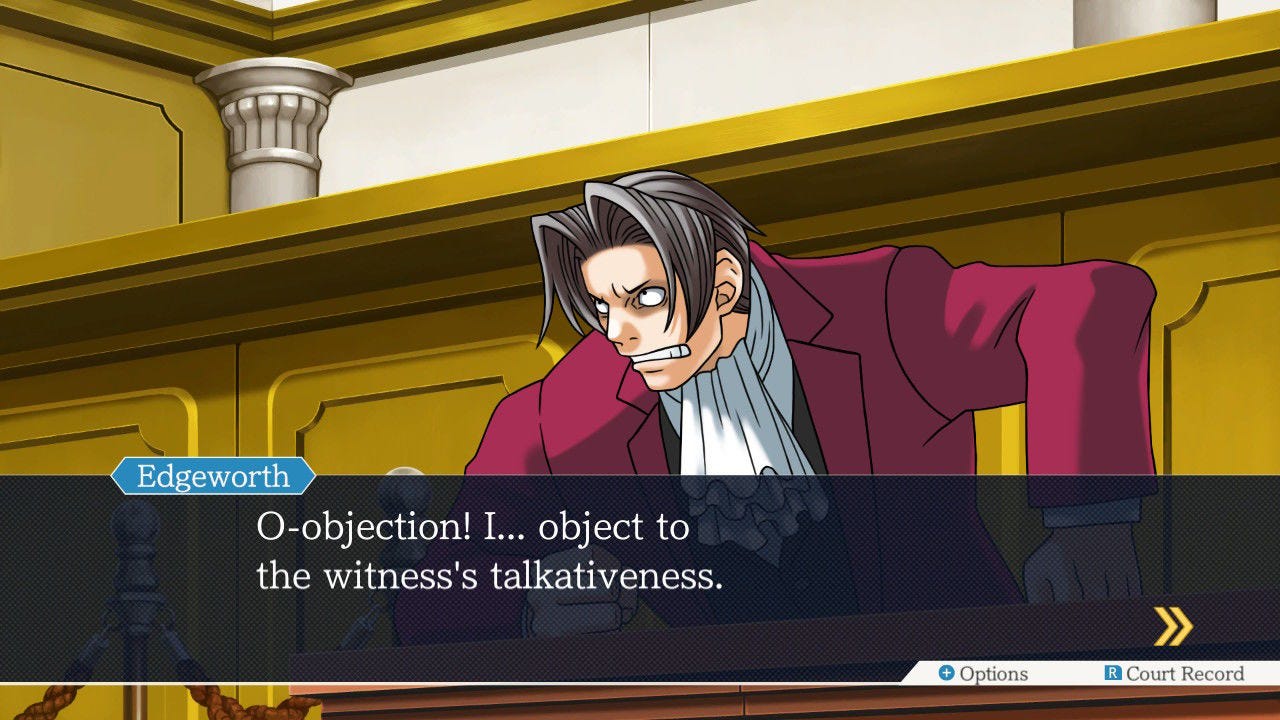
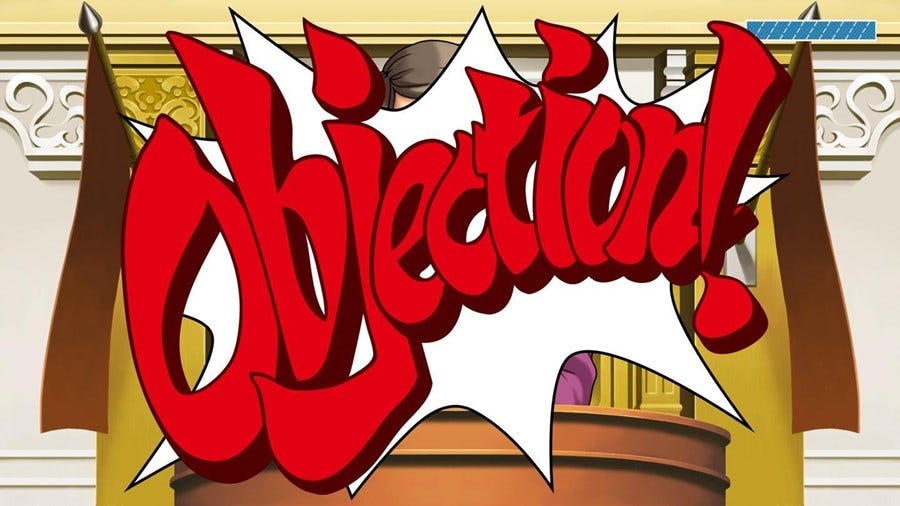
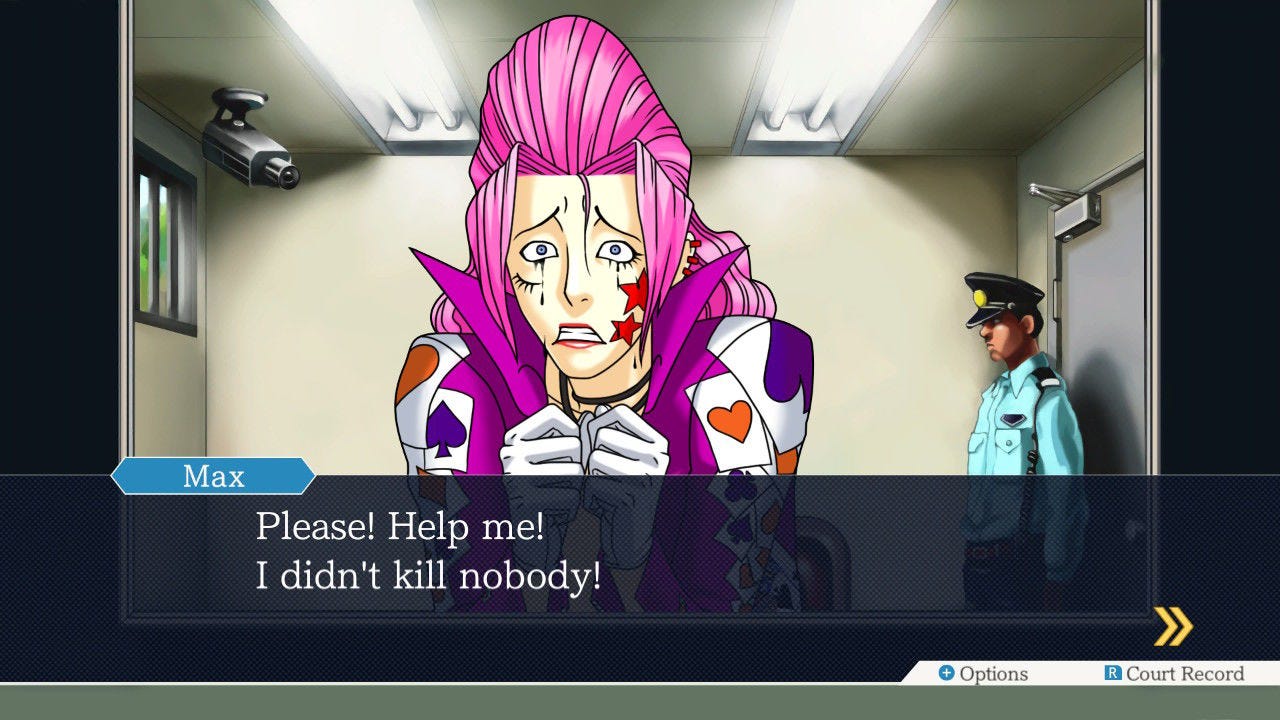
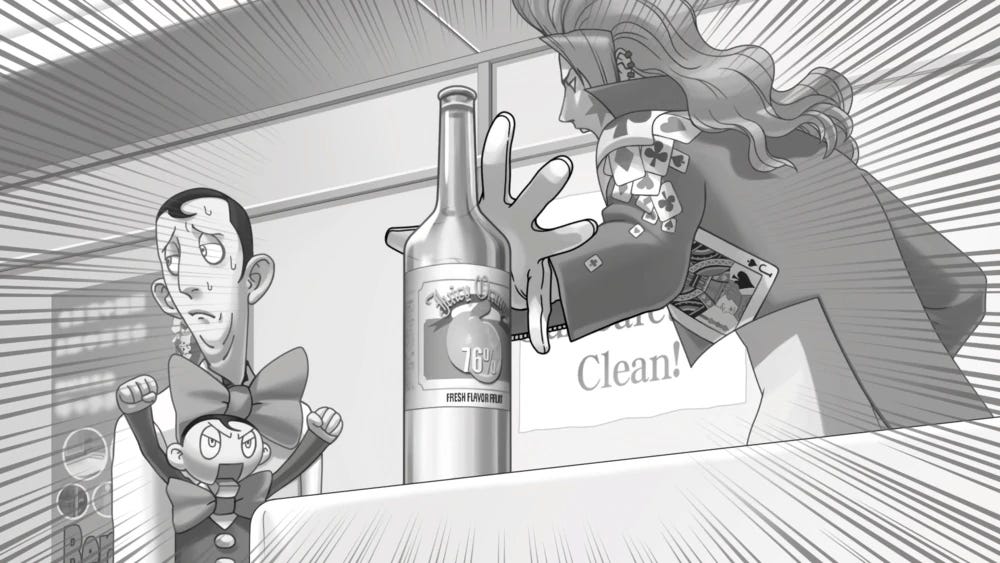

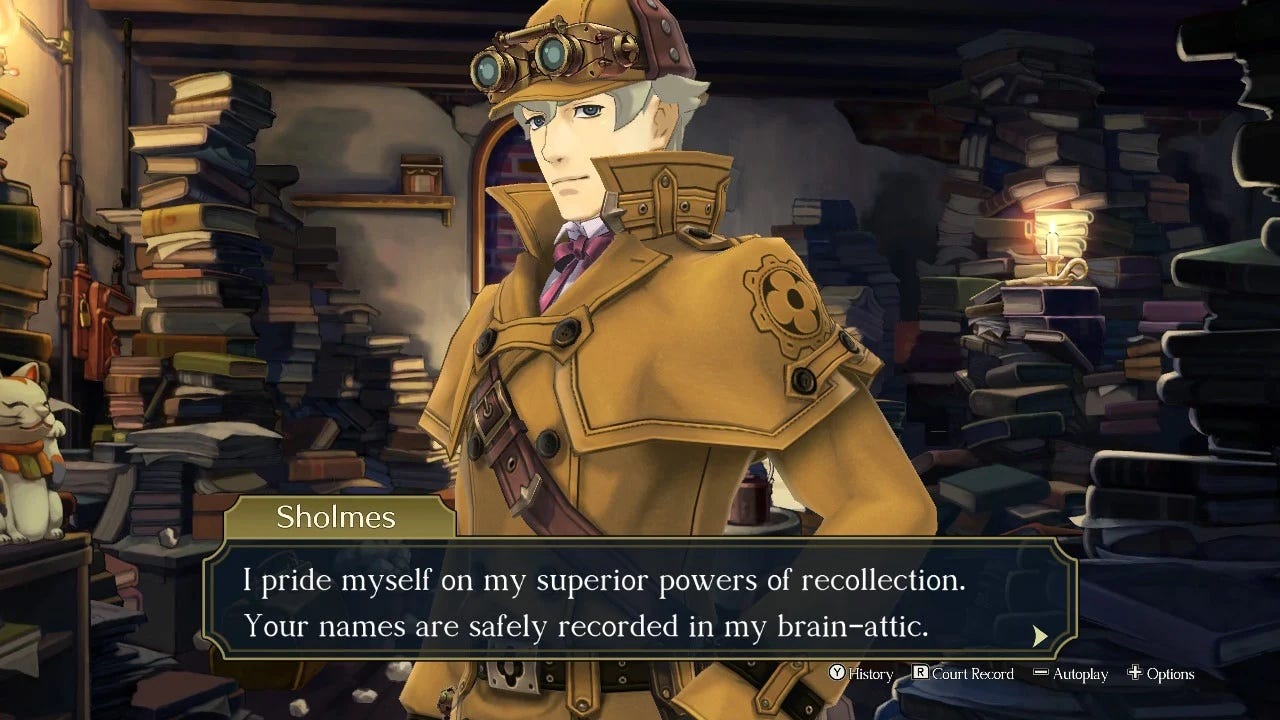

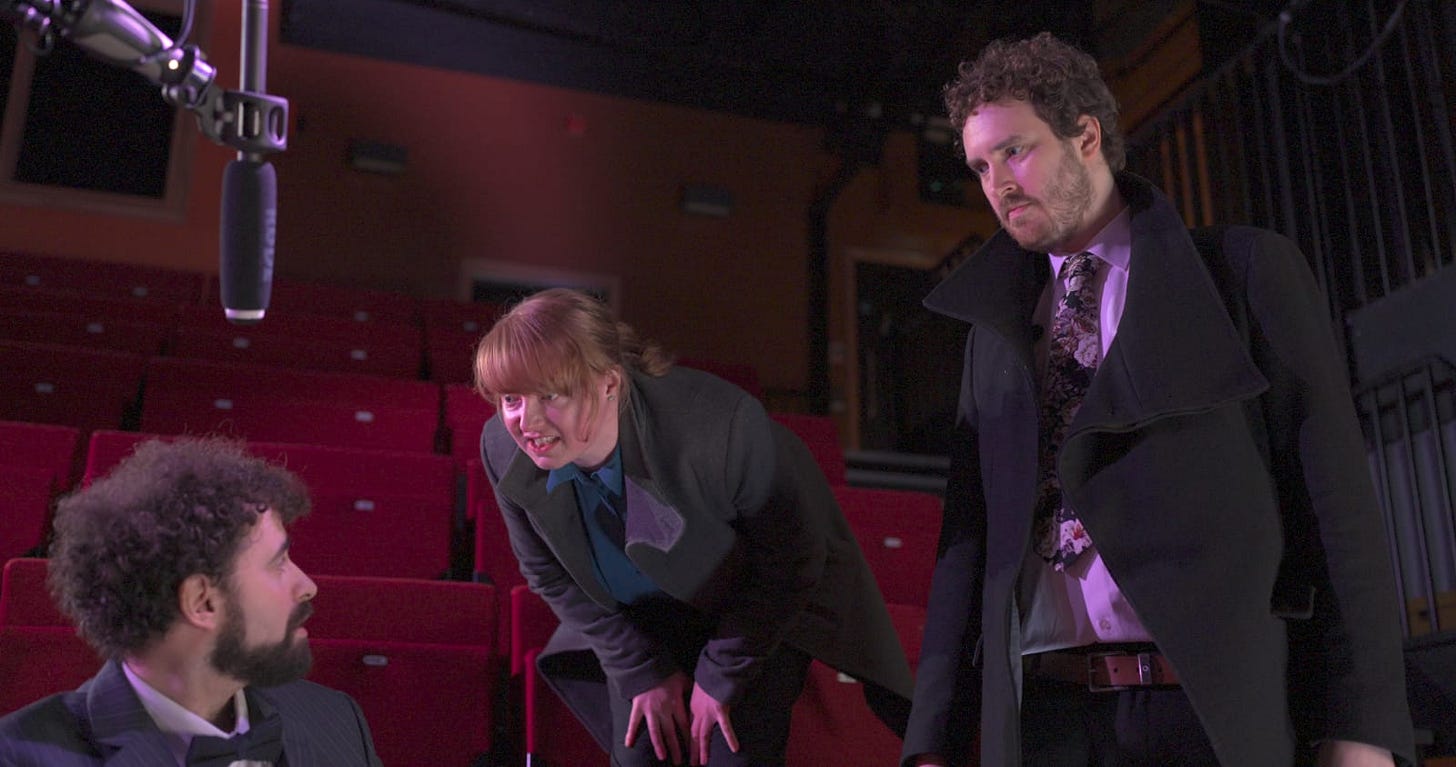

My pronouns are she, not her..... because I'll never be Her(lock Sholmes)